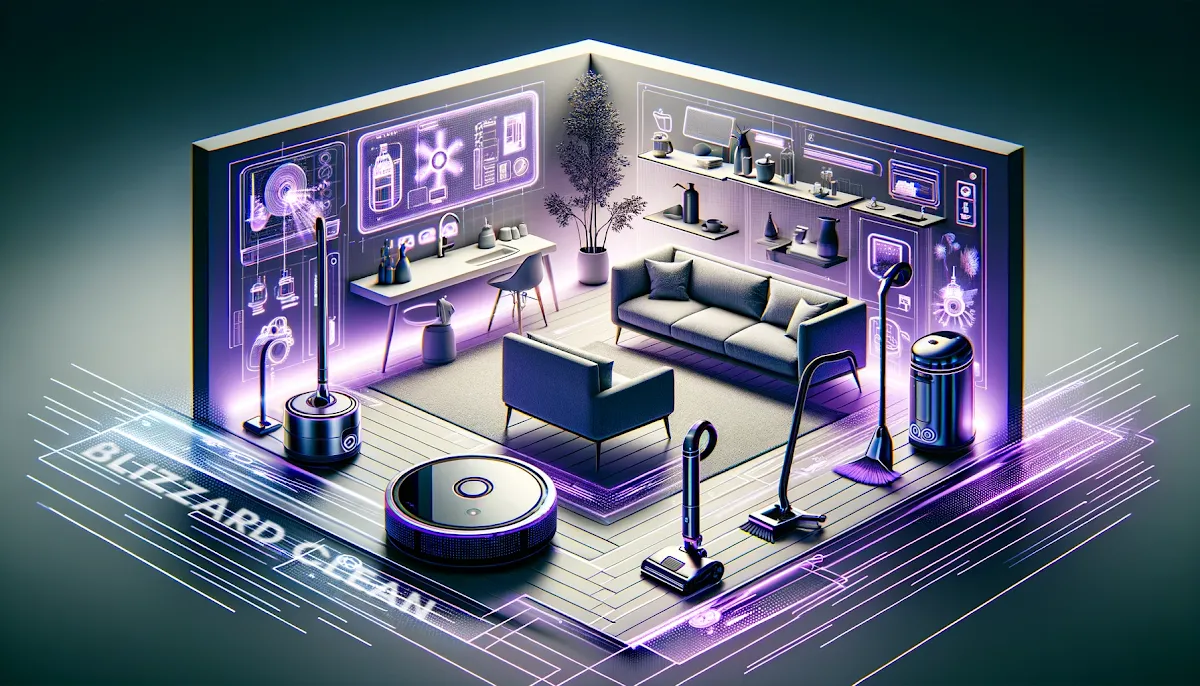In an era with a smart device for everything, cleaning has also had its fair share of technological transformations. For instance, automated and programmable robot vacuums have made it easier for homeowners to keep their environment clean without lifting a finger. Robotic mops and window cleaners have also joined the smart-cleaning party, making cleaning less tedious and freeing up our time for other tasks.
One fantastic example is the iRobot brand, which is known for its Roomba vacuum cleaners. These devices can be scheduled to clean during specific times of the day and can adjust depending on the type of floor it is cleaning.
Artificial Intelligence And Automation: The Future Of Cleaning
Automation, driven by robotics and artificial intelligence (AI) advancements, quickly becomes dominant within the cleaning industry, transforming traditional cleaning paradigms into efficient and smart solutions. Here’s a brief look at how automation shapes the future of cleaning.
- Smart Cleaning Robots: Automated cleaning robots, equipped with AI, are able to navigate spaces independently, adapt cleaning routines based on environmental factors, and ensure every nook and cranny is spick and span. These robots, such as automated vacuum cleaners and mops, are expected to be more commonplace in both commercial and residential settings.
- AI-Driven Predictive Cleaning: AI technology allows for predictive cleaning, where machines analyze data collected over time to predict which areas require cleaning and when resulting in more efficient cleaning schedules and less human intervention.
- Automated Waste Management: Automation also plays a role in waste management. Automated trash cans can sort, recycle, and even compact waste, making waste management more efficient and environmentally friendly.
- Disinfection Automation: In the wake of the COVID-19 pandemic, automated disinfection systems such as UVC robots have gained prominence, reducing the risk of disease spread and ensuring healthier environments.

Waste Management Revolutionized
Effective waste management plays a vital role in maintaining cleanliness, and technological productivity drives change in this field. Modern technology productivity thoroughly transforms waste management, emphasizing smart and sustainable strategies. Here’s where technology productivity is revolutionizing waste management.
- Smart Waste Bins: The use of smart waste bins equipped with sensors to track fill levels proves the efficacy of technology productivity. It enables waste collection services to optimize their schedules and routes, reducing futile pickups and enhancing service quality.
- Automated Sorting Systems: A fine example of technology productivity at work is advanced sorting machines that can identify and separate different types of waste materials for recycling. This technology productivity simplifies the segregation of recyclables from general waste and boosts the overall recycling process.
- Waste-To-Energy Technologies: There’s an increasing trend of converting waste into energy through innovative technologies like anaerobic digestion or incineration. By creating energy from waste, we can effectively use materials that were once considered useless.
- IoT (Internet of Things) In Waste Management: IoT-based solutions provide real-time data about waste: the amount, location, type, and more. This valuable information can help businesses and municipalities better manage waste and initiate proactive measures.
- Machine Learning And AI: Through monitoring historical data trends, these intelligent technologies can predict future waste production levels, enabling more efficient planning and resource allocation in the long run.
Use Cleaning Apps To Improve Productivity
Technology has also introduced us to various cleaning applications. These cleaning apps aim to enhance productivity by making cleaning tasks systematic, manageable, and engaging. Here’s a quick look at how such apps work.
- Task Organization: Several cleaning apps aid in organizing tasks into manageable chunks. These apps let users break down cleaning activities room-by-room, keeping track of tasks that need attention and ensuring an orderly cleaning method.
- Reminders And Schedules: Routine is key for efficient cleaning. Apps can set reminders or recurrent tasks, ensuring users never overlook a cleaning task. Some even offer suggested schedules based on common cleaning needs.
- Interactive Lists: Interactive checklist apps allow users to mark complete tasks and visually track progress. The sense of accomplishment from ticking completed tasks can be a significant motivator in maintaining a regular cleaning routine.
- Team Coordination: Particularly useful for housemates or families, certain apps enable shared task lists. This helps distribute chores evenly, ensuring everyone knows their responsibilities, improves team coordination, and avoids redundancy.
- Sharing Economy: Some apps also connect users with professional cleaning services. Users can schedule, track, and pay for such services through the app, providing a hassle-free solution when professional help is needed.

Cleaning Products, Technology And Productivity
The technology revolution has also ushered in innovative cleaning products. Cleaning products have come far from ordinary scrub brushes and bleach-based detergents. From environmentally friendly alternatives to advanced, technology-driven solutions, today’s cleaning products have transcended convention. Let’s explore how:
- Eco-Friendly Cleaning Products: Environmental consciousness has swept across industries, and cleaning products are no exception. Eco-friendly cleaners incorporate natural ingredients instead of harsh chemicals, reducing environmental impact and creating safer spaces with fewer toxins.
- Tech-Integrated Cleaning Tools: Many cleaning tools now combine traditional cleaning methods with technologies. Examples include microfiber mops with integrated spray systems, scrub brushes with built-in soap dispensers, and automatic soap/sanitizer dispensers with motion sensors.
- Specialized Cleaning Products: As cleaning becomes increasingly sophisticated, specialized cleaning products flourish. These may include distinct formulations targeted at particular materials (wood, glass, metal, etc.) or specific kinds of stains or dirt.
- Multipurpose Cleaning Products: On the other end of the spectrum, multipurpose cleaners can deal with various surfaces and stains, providing users with versatile efficiency.
Ways Technology Increases Productivity
There’s no denying the direct link between technology and productivity. Technology is critical in making us more productive, from boosting efficiency to streamlining workflows. Tools like Microsoft Teams, Slack, and Zoom transform remote work, making team collaboration effortless. They allow sharing of ideas, quick decision-making, and efficient information dissemination, enabling teams to work together seamlessly.
This innovation allows businesses to store and access data from anywhere, granting teams flexibility to work from any location promoting collaboration and productivity growth, even in the face of unexpected circumstances like the COVID-19 pandemic. Using Trello, Asana, or Basecamp for project management helps streamline work processes and boost productivity. Additionally, automation tools, like Zapier or IFTTT, can handle repetitive tasks, freeing up valuable time for teams to focus on more complex tasks.
Analytics tools, such as Power BI or Tableau, help businesses extract actionable insights from vast amounts of data, driving informed decision-making and improving productivity with technology. In industries like manufacturing, new technology is making us more productive, which is evident through advancements like 3D printing and assembly line robotics. By reducing errors and waste, these innovations vastly improve efficiency and productivity.
Technologies like performance management software or chatbots enhance employee engagement by providing valuable feedback and support, thus boosting productivity in today’s workplace.

Getting The Best Out Of Your Tools For Productivity
The power of technology to increase technology productivity isn’t a one-size-fits-all task. It requires careful strategies and being mindful of a few challenges.
Cloud-based tools offer flexibility and round-the-clock access to work materials, promoting technology productivity. Cloud-based solutions deliver smooth work progression, whether it’s collaborating with teams or streamlining tasks.
The world around us is changing, and how we clean is, too. As technology seeps into everyday activities, it offers unprecedented ways to keep our surroundings cleaner while making us more productive. So, whether it’s smart vacuuming robots, eco-friendly cleaners, or digital organizers, cleaning technology is changing the game!

